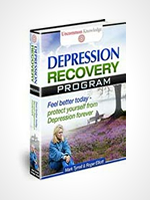Your Quick Depression Quiz Results
OK, let’s see how you did. Question 1 was: "Which of the following can be signs (symptoms) of clinical depression?"
a. Exhaustion on waking
b. Disrupted sleep, sometimes through upsetting dreams
c. Early morning waking and difficulty getting back to sleep
d. Doing less of what they used to enjoy
e. Difficulty concentrating during the day
f . Improved energy as the day goes on
g. Anxious worrying and intrusive upsetting thoughts
h. Becoming emotional or upset for no particular reason
i. Shortness of temper, or irritability
In fact, any of these can be symptoms of depression, although experiencing one or more of them does not necessarily mean you are depressed. Onto question 2...
Question 2 was: “Most depression is due to a chemical imbalance, or genetic factors. True or False?
The answer is False. Low serotonin levels are a consequence, not a cause of most depression. There is 10 times more major depression in people born after 1945 than in those born before. This, plus thousands of studies, clearly shows that the root cause of most depression is not a chemical imbalance. Human genes do not change that fast. Following on from this...
Question 3 was: "Which of the following are changes in society that have occurred since the end of World War II, and may account for the huge increases in clinical depression?"
a) A breakdown in the extended family
b) A dispersal of communities leading to less support
c) An increased focus on material wealth
d) An overwhelming prevalence of news media
e) An increased focus on 'the self' over the wider community
All these factors have contributed to the widescale increase in depression - and there are more besides. Our societies are literally creating depression by the way they are structured. Luckily, we know what to do to reverse this, both individually and in society as a whole.
Question 4 was “Why are you likely to wake up in the morning feeling exhausted if you are depressed?"
a . Because you aren’t getting enough exercise
b . Because you spend too much time in REM sleep due to over-dreaming at night
The answer is b. This is really important if you want to understand how depression works.
You are likely to wake in the morning feeling exhausted because when you ruminate negatively, you create emotional arousal that causes the release of stress hormones.
That night, in REM (dream sleep), you become emotionally aroused again as dreaming 'flushes out' the emotional arousal from your brain. That is why depressed people have higher levels of stress hormones, and also why you can wake up feeling exhausted.
Over-worrying or negative ‘rumination’ makes you dream more (depressed people dream up to three times more than normal). This is, quite literally, exhausting.
Also, serotonin production stops completely during REM sleep.
So, after a night of over-dreaming (even if you don’t remember your dreams) you’ll wake up with much lower levels of serotonin than normal. Daytime activity raises serotonin levels, making you feel better as the day progresses.
And finally, Question 5 was: "Why can ‘all-or-nothing’ thinking be one of the causes of depression?"
a. Because it causes emotional arousal, which makes your brain stressed, adding to the cycle of depression
b. Because it stops you problem-solving effectively, and so adds to any pressure you feel from life’s difficulties
In fact, as you probably guessed, both are correct.
When you are stressed, your brain works differently, making you more likely to resort to 'All-or-nothing' thinking, which causes difficulties in solving complex problems. In turn, this creates more arousal, or stress, and so continues the 'loop', increasing the amount you dream, and so exhausting you.
Happily, once your brain de-stresses properly, your thinking patterns normalize and you are able once again to think clearly.
This quiz is taken from our downloadable Depression Program, which gives you the knowledge, power and skills to break the cycle of depression.
Find out more about the Depression Recovery Program





